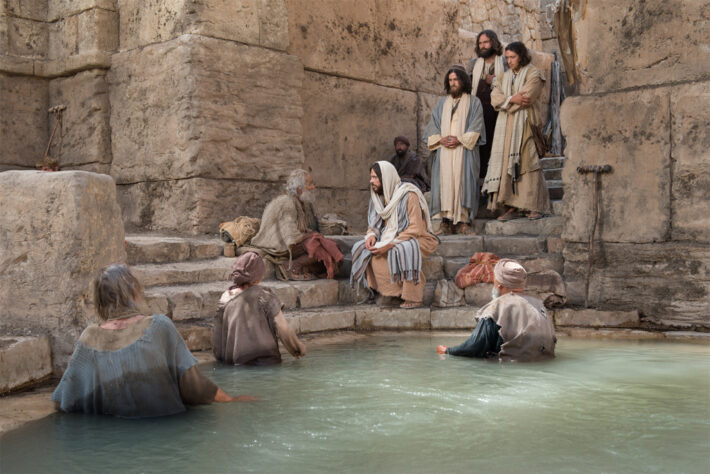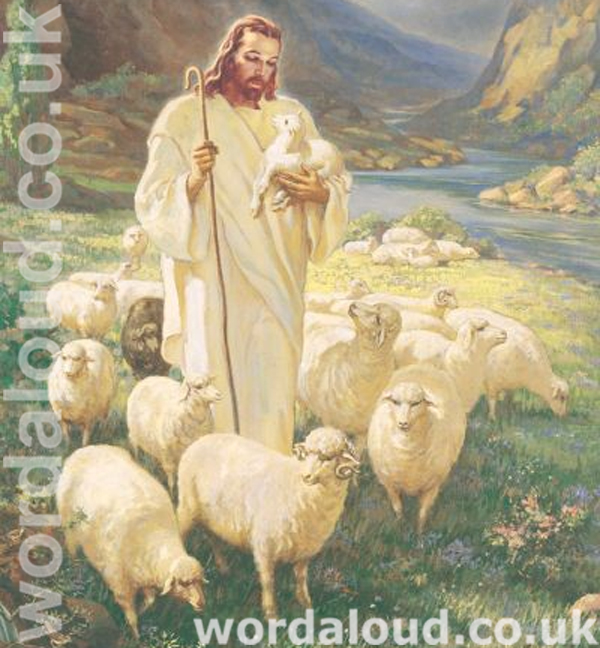Christian Art | Let Christians Serve One Another | King James Audio Bible KJV
Luke 17: 7-10 – Week 32 Ordinary Time, Tuesday (King James Audio Bible KJV, Spoken Word)
7 But which of you, having a servant plowing or feeding cattle, will say unto him by and by, when he is come from the field, Go and sit down to meat?
8 And will not rather say unto him, Make ready wherewith I may sup, and gird thyself, and serve me, till I have eaten and drunken; and afterward thou shalt eat and drink?
9 Doth he thank that servant because he did the things that were commanded him? I trow not.
10 So likewise ye, when ye shall have done all those things which are commanded you, say, We are unprofitable servants: we have done that which was our duty to do.
Jesus asks people to think of the usual relations between masters and servants, in which the master shows no gratitude to the servant for his having fulfilled his duties, offering to serve his needs in turn, but rather requires more, that further duties be performed.
Jesus is not approving of abusive and arbitrary behaviour. In presenting this scene to his listeners, he may be asking them to look again at their conduct and to reconsider the power relations in their lives, to confront his listeners, when abusive behaviour to others can so easily become the unquestioned norm. Pulling no punches, Jesus tells his listeners that they would behave in this manner.
On many occasions, Jesus seeks to reconfigure our idea of service, to reorient us to a life of service, and a Christian society in which all cheerfully serve each other – a true community. Jesus himself is the ultimate model of service. He is the Suffering Servant prophesied by Isaiah, who will pour himself out to death, becoming the definitive sin offering, and so redeeming humanity (Isaiah 53). He teaches his disciples that they are sent to serve, and to do so in all humility.
Jesus teaches us the attitude we should have to our Creator. Everything flows from God. Our existence is a gift from God. We do not, then, approach God with pride in having obeyed His commandments and a sense of entitlement to a reward. We will have only done what was our duty. At our best, we will have offered humble service.
10 For as the rain cometh down, and the snow from heaven, and returneth not thither, but watereth the earth, and maketh it bring forth and bud, that it may give seed to the sower, and bread to the eater:
11 So shall my word be that goeth forth out of my mouth: it shall not return unto me void, but it shall accomplish that which I please, and it shall prosper in the thing whereto I sent it. (Isaiah 55: 10-11)
Concluding Prayer | Love Revealed By Jesus Christ
Almighty God,
who revealed to Peter your plan for the salvation of all,
grant that our work may be acceptable to you,
and that, by your grace, it may further your loving purpose of redemption.
Through Christ our Lord.
![]()

King James Audio Bible | Endnotes
Let Us Serve One Another
This Gospel passage is about humility and service. It teaches us that we should not expect praise or recognition for doing what we are supposed to do. As servants of God, we have a duty to serve Him and others, and we should do so with humility.
One of the most important aspects of humility is recognizing that we are not the center of the universe. This is a lesson that is taught throughout the Bible. In Philippians 2:3, we are told to ‘do nothing through strife or vainglory; but in lowliness of mind let each esteem other better than themselves.’. In James 4:6, we are told that ‘God resisteth the proud, but giveth grace unto the humble’. And in Proverbs 16:18, we are warned that ‘Pride goeth before destruction, and an haughty spirit before a fall’.
Service is an aspect of Christian life. Jesus said that ‘the Son of man came not to be ministered unto, but to minister, and to give his life a ransom for many’ (Matthew 20:28). In John 13:14-15, Jesus also said: ‘If I then, your Lord and Master, have washed your feet; ye also ought to wash one another’s feet. For I have given you an example, that ye should do as I have done to you.’
Many Christians have spoken about humility and service. Saint Augustine wrote: ‘Do you wish to rise? Begin by descending. You plan a tower that will pierce the clouds? Lay first the foundation of humility.’ (Confessions, Book XII) Saint Francis of Assisi is also known for his humility and service, as he devoted his life to serving the poor and living a simple life.
Pope Francis has called on Catholics to ‘be humble servants of one another, and of the poor and marginalized’ (Evangelii Gaudium, 105). Pope Francis has also spoken about the importance of recognizing our own limitations and weaknesses, and relying on God’s grace to overcome them.
The Cost Of Discipleship – Dietrich Bonhoeffer
The Cost Of Discipleship is a book written by the German Lutheran theologian and pastor Dietrich Bonhoeffer. The book was originally published in 1937, during a time when Nazi Germany was exerting increasing control over the German church.
Bonhoeffer was deeply concerned about the state of the German church and the lack of true discipleship among its members. He saw a great danger in the way that many Christians in Germany had reduced the message of the gospel to a mere intellectual exercise, divorced from any real commitment to Christ and his teachings.
In The Cost Of Discipleship, Bonhoeffer sets out to articulate a vision of what true discipleship looks like. He argues that discipleship is not simply a matter of belief or intellectual assent, but requires a complete reorientation of one’s life.
One of Bonhoeffer’s key concepts in the book is the idea of ‘cheap grace’. He argues that many Christians in his time had come to believe that forgiveness and salvation could be obtained without any real change in behavior or commitment to Christ. This, he believed, was a dangerous and false idea, as it reduced the message of the gospel to a mere formula for salvation, divorced from any real transformation of the individual’s life.
In contrast to this idea of cheap grace, Bonhoeffer presents the concept of ‘costly grace’. Costly grace, he argues, is the idea that true discipleship requires a complete surrender of one’s life to Christ, even if it means taking up the cross and following him to death. This vision of discipleship requires a radical commitment to obedience to Christ and a willingness to make sacrifices for the sake of the gospel.
Throughout the book, Bonhoeffer emphasizes the importance of obedience to Christ and the call to radical discipleship. He argues that true discipleship requires a complete reordering of one’s life, in which everything else is subordinated to the call of Christ. He also offers critiques of the institutional church and of the prevalent theology of his time, which he felt had lost sight of the radical demands of the gospel.
Despite the challenges and dangers of living out this vision of discipleship, Bonhoeffer believed that it was the only way to truly follow Christ. He himself lived out this vision of costly grace, and was ultimately arrested and executed by the Nazis for his involvement in the resistance movement against Hitler.








